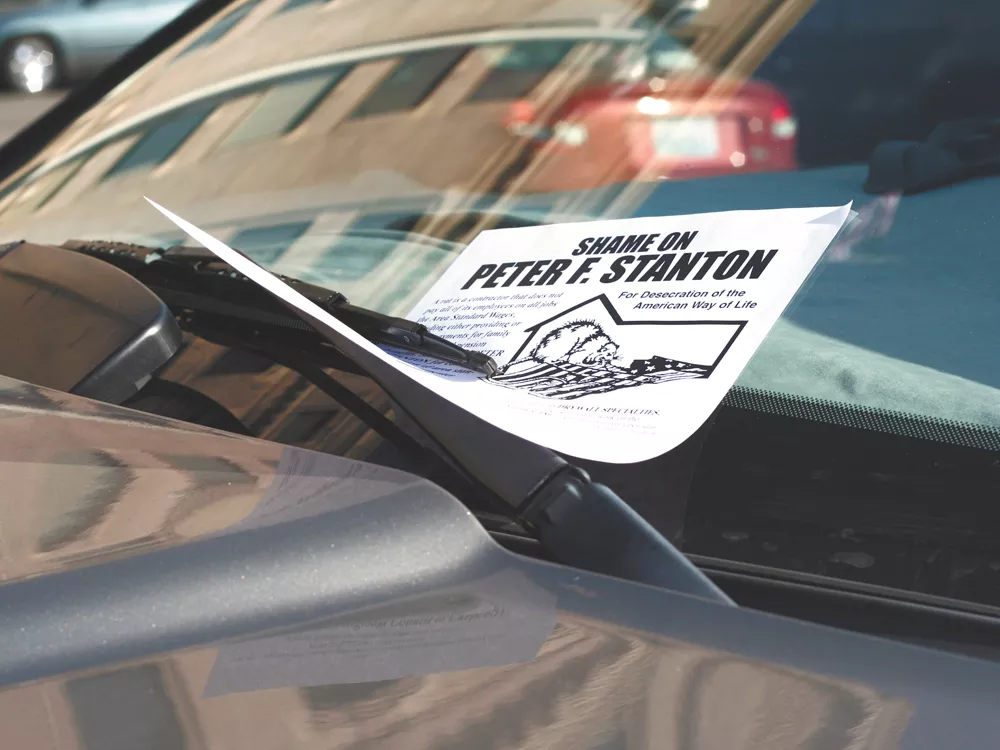
Randy Fewel, the president of Inland Northwest Bank, still has the message saved on his phone.
“Another carpenter to tell you what a dirtbag you are, Randy,” a unidentified voice says. “And we believe we have a way to make you pay our wages. Talk to you real soon.”
For nearly six months, Fewel says, he’s been a target. “SHAME ON RANDY FEWEL” read flyers from Pacific Northwest Regional Council of Carpenters, accusing him of “Desecration of the American Way of Life.” In the crude sketch under that, a rat gnaws on an American Flag: “A rat is a contractor that does not pay all of its employees on all jobs Area Standard Wages.”
The union flew a “Shame on Randy Fewel” banner outside of his business, and even, for a few weeks, outside his condo in Browne’s Addition. “I think it’s a very cheap, petty tactic to name me personally,” Fewel says.
The carpenters’ union dispute isn’t even directly with Fewel. Inland Northwest Bank hired a contractor, Leone & Keeble, which hired a subcontractor, Drywall Specialties. The wages paid by Drywall Specialties are what have raised the union’s ire. Despite those degrees of separation, though, Fewel has been the one most visibly in the crosshairs.
It’s a strategy that’s been used against other business owners in Spokane, including Davenport developer Walt Worthy. Last Thursday, two hired pamphleteers peppered cars with near-identical flyers that, in this instance, targeted Peter Stanton, CEO of Washington Trust Bank, for his third-hand involvement with Drywall Specialities.
Banners using the same template have been posted outside a Ross store in Tacoma, a Fred Meyer in Burien, an H&M clothing store and the St. Pius X Parish in Portland, Ore. The union wouldn’t say how many shame campaigns it has launched or have running currently, only that they are “numerous.”
“The carpenters have been in existence for over 100 years,” says Eric Franklin, communications director for the Pacific Regional Councils of Carpenters. “My grandfather and his father was a carpenter. They struggled to have something to make a living wage. It didn’t come easy.”
The carpenters’ union couldn’t slap Fewel’s name on a picket sign. Picketing a secondary business is illegal. But those rules don’t apply to banners or flyers, or even, the National Labor Relations Board ruled, a giant 16-foot-high rat balloon. Even large businesses usually have some idea of the wages their sub-contractors are paying, Franklin says, and they shouldn’t be able to duck their role in driving down wages. He rejects the idea that union carpenters would make threatening phone calls, but says they will sometimes fly banners outside the personal homes of business owners.
The campaigns aren’t to unionize more carpenters, he says, but to push businesses to pay higher wages. In that, Franklin says, the union has been quietly successful.
In Eastern Washington, work on any publicly funded project has a set minimum wage, from $21.15 an hour for an apprentice carpenter’s first job to $37.90 an hour for a fully certified journey carpenter. But the union is protesting against businesses for not meeting “Area Standard Wages,” an even higher standard. Franklin says their figure, $38.88 an hour, is enough to raise a family, pay for health care and retire with a pension. Full-time it would be an almost $80,000 a year salary — twice Spokane’s median household income — but since construction slows in the winter, many carpenters rely on unemployment in the off-season.
The union has been sending letters criticizing Drywall Specialties for three years. Jeff Miller, president of Drywall Specialties, says the wages he pays — ranging from $16 to $26 an hour — are competitive. His employees have health insurance, a 401k and retirement plans, he says.
“They think that all the jobs should be their jobs,” Miller says about the union. “Some of the jobs they’re picketing, they didn’t even bid on.”
In Spokane, unions have struggled. Wayne Brokaw, executive director of the Inland Northwest Associated General Contractors, says he can’t think of a single company that’s signed on with the contractors’ union master agreement in the past six years.
“The union carpenters are in a tough situation,” he says. “There’s not a lot of work, and so a lot of their carpenters are unemployed.”
In Nampa, Idaho, subcontractor Northwest Interiors president Mike Packard says he tries to pay his employees as well as the market allows. But he’s not only had union banners and flyers attack the businesses that hire him, he says he’s also been followed.
“These guys, they followed me to my dentist, they followed me to my church,” Packard says. “I can’t tell you how intimidating it is.”
Fewel says he believes the union’s strategies will backfire. “I refuse to be bullied,” he says. “I’ve never seen a business try to use a bullying tactic to gain more business.”
